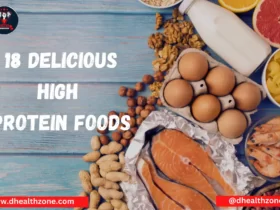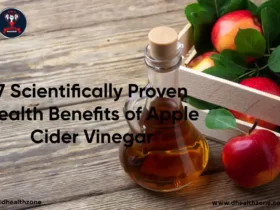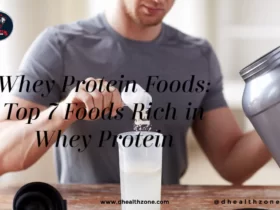Whey protein is probably best known as a post-workout supplement that helps with muscle growth and repair. Adding more whey protein foods to your diet is a particularly healthful approach to get more protein. However, as it is a natural food, you can add more natural sources of whey protein.
Knowing about natural sources of protein or whey protein foods will increase the variety in your diet and make it simpler for you to reach your protein targets and achieve your objectives. Compared to purchasing whey protein supplements, you can also save money by including whey protein foods in your regular diet.
In this post, we’ll outline the top 7 whey protein foods or foods high in whey protein that you may have before or after working out, going to the gym, or going to work. You can also consume these foods if you’re trying to lose weight.
What is Whey Protein?
Whey protein is a type of milk protein and it is the watery portion of the milk that separates from the curds when making cheese. Whey protein is then processed into a powder that is commonly sold as a supplement.
It is frequently consumed as a nutritional supplement and is also present in a number of whey protein foods, including milk, yogurt, and cheese. In fact, one of the most widely used ingredients in protein bars and shakes is whey protein. Especially for those who are physically active and need to support muscle growth and recuperation, it’s a practical approach to enhance protein intake.
Benefits of Taking Whey Protein Foods
Whey protein is a well-liked dietary supplement among athletes and bodybuilders. Here are five benefits of consuming whey protein foods:
1. Muscle growth:
Leucine, which is critical for muscle building, is one of the abundant amino acids in whey protein. It can assist in promoting muscle recovery and repair when consumed after exercise, which will eventually result in increased muscular mass.
2. Weight loss:
One study that was published in Nutrition and Metabolism claims that Whey protein aids in weight loss as well. It can aid in reducing hunger and enhancing feelings of fullness, which can result in a decrease in calorie intake. Accelerating metabolism and fat burning may also aid in weight loss.
3. Lower Blood Pressure:
Whey protein can assist persons with high blood pressure lower their blood pressure, according to studies. This is due to the fact that whey protein contains bioactive peptides that can facilitate blood vessel relaxation and enhance blood flow.
4. Improved Bone Health:
Whey protein is also good for bones, particularly in older people. By Boosting bone mineral density, it may help lower the risk of fractures and osteoporosis.
Also Read- What causes Skin Tags on the Neck? How to Get Rid of Skin Tags on Neck?
5. Improve Immune Function:
Immunoglobulins and other substances that sustain the immune system of the body are also present in whey protein. The likelihood of becoming ill and infectious can be reduced by doing this.
Top 6 Whey Protein Foods That You Can Take!
Whey protein can be a helpful addition to your diet if you’re trying to achieve your goals of muscle growth or maintaining a healthy lifestyle. In this article, we’ll explore the top 6 whey protein foods that you can easily incorporate into your daily routine.
We’ll explore a variety of foods, from dairy to plant-based options, to help you meet your protein requirements and improve your overall health. So let’s get started and learn about the best whey protein foods for your diet!
1. Ricotta Cheese

A tasty and adaptable cheese, ricotta is frequently used in a variety of Italian dishes. Yet, did you know that ricotta cheese is a fantastic source of whey protein as well? Ricotta cheese is actually one of the best whey protein foods you can include in your diet.
Besides that, it supports the feeling of fullness, which can support weight loss attempts. One ounce of ricotta cheese has about 2.5 grams of whey protein, which makes it a simple and practical option to enhance your daily protein consumption. Ricotta cheese is a delicious and healthy method to increase your whey protein intake, whether you eat it by itself or as an ingredient in your favorite dishes.
Thus, if you’re seeking a tasty and beneficial source of whey protein, think about including ricotta cheese in your next meal.
Whey Protein Content- As mentioned before, one ounce of ricotta cheese has about 2.5 grams of whey protein. The National Nutrition Database for Standard Reference of the United States Department of Agriculture (USDA) can verify this information.
2. Cow Milk
We all know that milk is a fantastic drink for maintaining bone health, but did you also know that it is a natural source of whey protein? Cow milk, in fact, is one of the best natural sources of whey protein that you can include in your diet.
According to some studies, cow’s milk contains about 80% casein and 20% whey proteins. This implies that you are already getting a significant amount of whey protein from drinking cow’s milk.
Whey protein is also abundant in milk products like cheese, yogurt, and protein powder that are manufactured from cow’s milk. Cow milk is a nutrient-dense and practical way to enhance your daily protein consumption, whether you’re an athlete aiming to gain muscle or just trying to maintain a healthy lifestyle. Hence, if you’re searching for whey protein foods, think about including cow milk and dairy products in your diet.
Whey Protein Content- One study claims that 20% of the total protein in 1 liter of milk, or 6.3 grams of whey protein, is present in 1 liter of cow milk.
3. Whey Protein Powder
Anybody wishing to enhance their daily protein consumption should consider whey protein powder because it is a highly-concentrated source of whey protein. It is made from cow’s milk and obtained by separating the whey protein from the rest of the milk’s ingredients.
Using whey protein powder is a quick and cost-effective way to increase the amount of high-quality protein in your diet. It comes in a variety of flavors and is simple to combine with milk or water to make a convenient protein shake.
This supplementation also improves whole-body protein metabolism and performance recovery following resistance exercise, according to a double-blind crossover study.
Whey protein powder is frequently used by bodybuilders and athletes as a component of their workout routines, but it can also be helpful for anybody trying to improve their general health and well-being.
Consuming whey protein powder is a good option if you’re looking for a high-quality whey protein source to include in your diet. You can support your fitness and health goals and satisfy your daily protein requirements with its assistance.
Whey Protein Content- Whey Protein Content totally depends on the type of Protein. In a scoop of 30-32 grams of whey protein concentrate, 20–22 grams of protein are present, while A 30-32 grams scoop of whey protein isolate has 24–25 grams of protein.
4. Greek Yogurt
Greek yogurt is created by straining normal yogurt, which eliminates the watery whey and produces a thicker, creamier yogurt. This method also increases the protein concentration in it, making Greek yogurt one of the best natural sources of whey protein.
According to some studies, Greek yogurt also contains calcium, magnesium, and phosphorus which are necessary for healthy bones and teeth. It is also a probiotic-rich diet that boosts regular digestion and works to build your immune system. Greek yogurt is a great protein source because it contains two to three times as much protein as regular yogurt.
Greek yogurt may be used as a versatile ingredient in a wide range of recipes, from smoothies to dips and sauces, thanks to its creamy texture and tangy flavor.
Whey Protein Content- Greek yogurt has about 2.8 grams of whey protein and 10.4 grams of protein per 100 grams, according to research by FoodData Central.
5. Whey Protein Bar

Whey protein bars are a well-liked and practical way to get a quick and simple dosage of high-quality protein. These bars are a fantastic alternative for anyone trying to enhance their daily protein consumption or searching for a post-workout snack.
They contain whey protein, a complete protein that has all nine of the essential amino acids needed for muscle growth and repair.
A protein bar typically includes 5-10 grams of fat, 25-35 grams of carbohydrates, and 5-10 grams of fiber, according to some studies.
It’s important to remember that not all protein bars are the same and some may contain added sugar, preservatives, and other unhealthy substances. It’s crucial to pick a bar with natural ingredients, minimal sugar content, and premium whey protein to make sure you’re getting the best whey protein bar possible.
Whey protein bars are a good option if you want to quickly and easily increase the amount of high-quality protein in your diet. They are a delightful and practical approach to complement your fitness and health objectives.
Whey Protein Content- Most protein bars, according to FoodData Central Research, have between 150 and 400 calories and 10 and 20 grams of protein per portion, though some have closer to 30 grams.
6. Whey Protein Shakes
In order to enhance the amount of high-quality protein in your diet, whey protein shakes are a popular and useful option.
We can make whey protein shakes using whey protein powder and other ingredients such as fruits, vegetables, and good fats.
These shakes are a great option for post-workout recovery, as the protein they contain is quickly absorbed by the body. Whey protein shakes usually have 20 to 30 grams of protein per serving and come in a range of flavors to fit different tastebuds.
Because the majority of whey protein powders used to make these whey protein shakes are either lactose-free or low in lactose, therefore they’re also a great option for people who can’t handle lactose.
Whey protein shakes not only provide high-quality protein but are also an excellent source of vitamins and minerals. In some variants, additional nutrients such as vitamin D, calcium, and iron are added as preservatives.
Whey protein shakes are the quickest and simplest method to add more protein to your daily diet, so if you’re looking for whey protein foods, you should add them to your list.
Whey Protein Content- A serving of whey protein shakes typically contains 20–27 grams of high-quality complete protein, making it a very practical (and affordable) method to meet your daily protein requirements.
Bottom Line
In the end, including whey protein foods in your diet is a wise and healthful decision. Whey protein is a superior protein that offers the crucial amino acids needed for muscular development, maintenance, and recovery.
You can readily increase your protein consumption and support your overall health and fitness goals by consuming whey protein foods such as ricotta cheese, cow milk, goat milk, greek yogurt, whey protein powder, whey protein bars, and whey protein shakes.
Whether you’re an athlete, fitness fanatic, or just trying to live a healthy lifestyle, including these whey protein foods in your diet is a great way to increase your protein intake and make sure you’re getting the vital nutrients your body requires.

















Leave a Reply